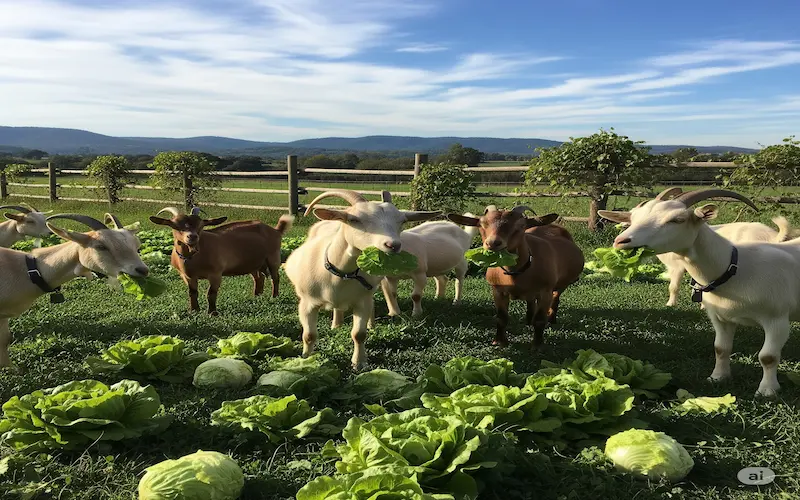Can Goats Eat Lettuce? Safe Feeding Tips Inside
Published: 26 Jul 2025
If you raise goats, you’ve probably asked yourself: Can goats eat lettuce? It’s a common question, especially when you’re chopping salad and thinking about sharing some with your herd.
Goats are known for nibbling on all sorts of things, but not everything they eat is safe. Lettuce is light, green, and healthy for us. But is it good for goats, too?

The quick answer? Yes, goats can eat lettuce—but only in moderation. In this blog, we’ll explore the benefits, risks, and best ways to feed lettuce to your goats safely. Whether you’re a backyard hobby farmer or new goat parent, this guide will help you make the right choice.
Can Goats Eat Lettuce?
Yes, goats can safely eat lettuce. Most types of lettuce—like romaine, butterhead, and leaf lettuce—are not harmful to goats. They enjoy the crisp texture and mild taste.
But there’s a small catch…
Lettuce should be a treat, not a full meal. While it’s hydrating and low in calories, it doesn’t give goats all the nutrients they need. Think of it like a light snack—great on a hot day, but not enough to keep your goat strong and healthy.
✅ Safe Types of Lettuce for Goats:
Romaine lettuce (best option—more nutrients)
Butterhead or Boston lettuce
Green or red leaf lettuce
Loose-leaf lettuce
⚠️ Types to Avoid or Limit:
Iceberg lettuce—it’s mostly water and has very little nutrition. Too much can cause diarrhea.
Wilted or moldy lettuce—always avoid. Mold can be toxic to goats.
So, yes—your goats can munch on lettuce. Just keep it fresh and clean, and serve it in small portions
Health Benefits of Lettuce for Goats
Lettuce may not be a superfood, but it still offers some health benefits when fed in moderation. Let’s take a quick look at how it helps:
🌿 1. Hydration Boost
Lettuce contains a high amount of water—up to 95%! This makes it a great summer snack, especially during hot and dry days. It helps keep your goats cool and hydrated.
🌿 2. Low in Calories
Goats can gain weight quickly if fed too many rich or starchy foods. Lettuce is very low in calories, making it a safe treat that won’t mess with their diet.
🌿 3. Light Source of Fiber
While it’s not a high-fiber vegetable, lettuce still contains a small amount of fiber. This can help support digestion when paired with a roughage-based diet (like hay or pasture).
🌿 4. Vitamins and Minerals
Some lettuce types, like romaine, provide:
Vitamin A – Good for vision and skin
Vitamin K – Helps with blood clotting
Folate – Supports healthy cells
Calcium – Important for strong bones
🐐 Tip: Romaine lettuce has more nutrients than iceberg. It’s the best choice if you want to add something healthy to your goat’s treat routine
⚠️ 4. Risks and Precautions When Feeding Lettuce to Goats
While lettuce can be a safe treat, there are still a few things you need to watch out for. Feeding it the wrong way or in large amounts may upset your goat’s tummy or cause other issues.
🚫 1. Too Much Water, Too Little Nutrition
Lettuce, especially iceberg, is mostly water and offers very few nutrients. Feeding too much can fill up your goat without giving them the energy and nutrients they need.
What to do:
Only offer lettuce as a treat—not a meal replacement.
🚫 2. Pesticides and Chemicals
Store-bought lettuce may have pesticides or chemicals that are harmful to goats.
What to do:
Always wash the lettuce thoroughly before feeding.
If possible, choose organic or homegrown lettuce.
🚫 3. Spoiled or Moldy Leaves
Old, slimy, or moldy lettuce can cause digestive issues or even make your goats sick.
What to do:
Check the lettuce before feeding. Never give rotten or wilted greens to your goats.
🚫 4. Choking Hazard for Kids (Young Goats)
Young goats (kids) may choke on large lettuce leaves if not torn into smaller pieces.
What to do:
Cut the leaves into smaller strips for easier chewing.
🥬 5. Best Types of Lettuce for Goats
Not all lettuce is created equal—some types are better for your goats than others. While most are safe in small amounts, here’s a breakdown of which kinds are best and why.
🥗 1. Romaine Lettuce – The Top Choice
Why it’s good: Romaine contains more nutrients than iceberg. It’s rich in fiber, vitamin A, and folate.
Feeding tip: Wash thoroughly and chop it up. Great as an occasional treat.
🥗 2. Green Leaf Lettuce
Why it’s good: Offers vitamins A, C, and K, plus fiber.
Feeding tip: Fresh and crunchy—goats love the texture.
🥗 3. Red Leaf Lettuce
Why it’s good: Similar to green leaf but with extra antioxidants.
Feeding tip: Mix with other greens to add variety to their diet.
⚠️ 4. Iceberg Lettuce – Feed Sparingly
Why to limit it: Iceberg has the least nutrition and too much water.
Feeding tip: Only give small portions, and not daily.
🥗 5. Butterhead (Boston or Bibb)
Why it’s good: Tender and sweet, with moderate nutritional value.
Feeding tip: Offer in moderation, especially during warmer months.
🥬 6. How to Feed Lettuce to Goats the Right Way
Feeding lettuce to goats is simple, but there are a few tips to keep it safe and healthy. Goats are curious eaters, so offering greens the right way makes a big difference.
✅ Wash Thoroughly Before Serving
Why: Lettuce can carry pesticides, dirt, or bacteria.
Tip: Rinse under clean water and shake off excess moisture before giving it to your goats.
✅ Chop or Tear Into Pieces
Why: Smaller pieces are easier to chew and reduce choking risks.
Tip: Especially helpful for young goats (kids) or older ones with dental issues.
✅ Mix With Other Safe Veggies
Why: Lettuce alone isn’t a balanced treat.
Tip: Combine with carrots, kale, or cucumber slices for a more nutritious snack.
✅ Feed in Moderation
Why: Lettuce is low in calories and nutrients. Too much can lead to watery stools.
Tip: Use it as an occasional treat—not a meal replacement.
❌ Don’t Feed Rotten or Slimy Lettuce
Why: Spoiled greens can upset their stomach or cause illness.
Tip: Always check for freshness. If you wouldn’t eat it, don’t feed it to your goats.
🕐 7. How Often Can Goats Eat Lettuce?
You might be tempted to toss lettuce to your goats daily, especially if you have leftovers. But moderation is key to keeping your herd healthy and happy.
🍃 Not Every Day
Why: Lettuce lacks the full range of nutrients goats need.
Tip: Offer it once or twice a week as a treat, not a staple.
🥗 Small Servings Only
Adult goats: A handful of chopped lettuce per goat is enough.
Young goats (kids): Offer even less—just a few small pieces to test tolerance.
🚫 Avoid Overfeeding
Why: Too much lettuce can cause diarrhea due to its high water content.
Plus: It may reduce their intake of hay or grains, which provide better nutrition.
🌱 Watch Their Reaction
Every goat is different. Start small, observe, and adjust as needed.
If your goat seems gassy, bloated, or disinterested in regular food, cut back immediately.
✅ 8. Final Tips for Feeding Goats Lettuce
Before you walk out to the pen with a basket of greens, keep these simple tips in mind to make sure your goats stay safe and healthy.
✔ Wash the Lettuce First
Always rinse lettuce well to remove pesticides, dirt, or bugs. Even organic lettuce can carry unwanted germs.
✔ Chop It Up
Cut lettuce into small, bite-sized pieces to avoid choking—especially for kids (baby goats).
✔ Mix It With Other Treats
Want to make things interesting? Add a few lettuce pieces to a small veggie mix with:
Carrot slices
Cucumber bits
Apple chunks (no seeds)
✔ Use It as a Training Treat
Lettuce is light and easy to carry—perfect for hand-feeding and building trust with shy or young goats.
✔ Know Your Goat’s Diet
Lettuce is a treat, not a meal. Stick to a diet rich in hay, pasture plants, and grains to keep your goats energetic and productive.
Conclusion:
So, can goats eat lettuce? Absolutely—just in moderation! Lettuce can be a fun, refreshing snack for your goats, especially on warm days. I love giving my herd a few crisp leaves now and then—it keeps them curious and happy. Just remember: always wash it, chop it up, and offer it alongside their regular balanced diet. Got questions or your goat-feeding tips? Drop them in the comments or share this with a fellow goat lover!
FAQs about Can Goats Eat Lettuce?
Goats should not eat some vegetables. These can upset their stomach or make them sick.
Avoid feeding your goats these veggies:
Onions – They can harm red blood cells.
Garlic – It can cause tummy issues.
Potatoes – Especially green or raw ones.
Tomato leaves – These are toxic to goats.
Rhubarb – It has poison-like stuff for goats.
Avocados – They are unsafe and can be deadly.
👉 Always research before giving new foods to goats. What’s safe for humans isn’t always safe for them!
Goats can enjoy simple, fresh salads—but only with safe ingredients.
Here’s what they can eat in a salad:
Lettuce – Like romaine or green leaf.
Carrot slices – Raw and crunchy.
Cucumbers – Fresh and cool.
Bell peppers – No seeds, no spice.
Spinach (small amounts) – Too much isn’t good.
Apple slices – Remove seeds first!
👍 Keep salads plain—no dressings, sauces, or salt. Just fresh veggies and fruits!
Goats love leafy greens. They are a great treat and full of fiber.
Here are safe leafy greens for goats:
Romaine lettuce
Green leaf lettuce
Kale (in small amounts)
Collard greens
Dandelion leaves
Spinach (small amounts)
Turnip greens
❗ Too many greens like kale or spinach can cause bloating or kidney problems. So feed in moderation.
Yes, goats can eat cabbage—but not too much.
Cabbage is safe and healthy in small servings. It’s full of water and fiber. Most goats like its crunchy texture.
But don’t feed them too much. Cabbage can cause gas or bloating if overfed.
✅ Chop it into small pieces and mix it with other veggies for balance.

- Be Respectful
- Stay Relevant
- Stay Positive
- True Feedback
- Encourage Discussion
- Avoid Spamming
- No Fake News
- Don't Copy-Paste
- No Personal Attacks



- Be Respectful
- Stay Relevant
- Stay Positive
- True Feedback
- Encourage Discussion
- Avoid Spamming
- No Fake News
- Don't Copy-Paste
- No Personal Attacks




